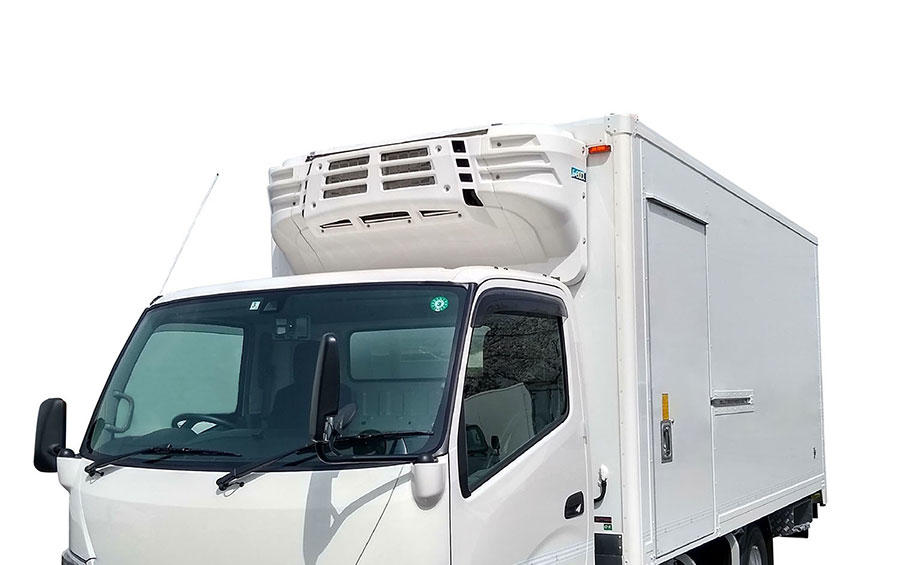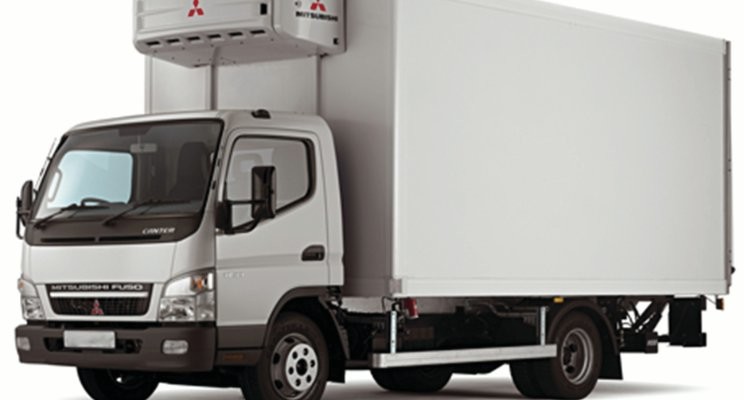Exactly How Cooled Trucks Operate to Ensure Safe and Effective Distribution of Perishable Product
Chilled vehicles play a critical function in the supply chain, guaranteeing that perishable goods are transferred safely and successfully. Using sophisticated refrigeration technologies and robust insulation, these lorries maintain accurate temperature level control, which is crucial for maintaining the quality of sensitive items. Additionally, modern developments in keeping track of systems provide real-time insights into internal problems, even more assuring conformity with market criteria. Nonetheless, in spite of these technologies, challenges continue to be in optimizing packing practices and navigating complicated logistics. Exploring these complexities discloses not only the modern technology at work yet additionally the more comprehensive ramifications for food safety and security and top quality guarantee.
Overview of Refrigerated Trucks
Refrigerated vehicles, frequently referred to as reefer trucks, play an important function in the transport of perishable items across different sectors. These customized vehicles are made to maintain specific temperature ranges, ensuring that things such as fresh fruit and vegetables, milk products, meat, and drugs continue to be risk-free for intake and efficient usage. The operation of refrigerated vehicles is vital in lowering wasting and extending the life span of temperature-sensitive products.
Reefer trucks are equipped with insulated cargo locations that can sustaining reduced temperatures, which can be adjusted according to the kind of goods being transferred. The automobiles normally utilize a refrigeration system powered either by the vehicle's engine or an independent power resource, enabling for consistent temperature level control throughout transportation.
Along with temperature level upkeep, these trucks are frequently developed with innovative monitoring systems to track the internal environment, guaranteeing compliance with health and wellness regulations. Furthermore, refrigerated trucks add substantially to the supply chain, allowing timely shipments to restaurants, customers, and retailers. Their crucial role underscores the significance of reputable transportation remedies in today's worldwide market, where quality is extremely important.
Trick Refrigeration Technologies
Keeping ideal temperature level control in chilled vehicles depends on several essential refrigeration technologies that improve performance and dependability. One of the most typical systems is the vapor-compression refrigeration cycle, which utilizes a refrigerant to take in heat from the truck's interior, decreasing the temperature level. This procedure includes a compressor, condenser, development shutoff, and evaporator, operating in tandem to circulate the cooling agent and preserve a regular climate.
One more notable technology is making use of eutectic plates, which save and release thermal energy. These plates are loaded with a phase-change material that strengthens at a particular temperature level, supplying a stable air conditioning resource. This method not only improves power effectiveness yet likewise lowers the requirement for constant power supply during transportation.
Additionally, progressed insulation materials, such as polyurethane foam, significantly enhance the thermal performance of refrigerated trucks, reducing temperature fluctuations throughout loading and discharging. Some contemporary chilled trucks likewise integrate telematics systems, enabling for real-time monitoring of temperature and efficiency, thus guaranteeing compliance with safety and security requirements. With each other, these innovations make certain the risk-free transportation of perishable items while optimizing operational efficiency and minimizing power usage.
Temperature Control Devices
Efficient temperature level control devices are important in making certain the integrity of perishable products during transport. Refrigerated trucks make use of sophisticated technologies to maintain constant temperature level varieties, avoiding putridity and making certain item safety and security. Central to these mechanisms is the refrigeration system, which runs using vapor-compression or absorption refrigeration systems. These systems are developed to cool down the air within the freight space effectively and maintain the needed temperature level throughout the trip.
Furthermore, modern-day chilled trucks are outfitted with digital thermometers and programmable temperature level surveillance systems. These systems enable real-time tracking of internal temperature levels, offering informs if the temperature level deviates from the established array. This ability is important for conformity with health and security policies.
Insulation additionally plays a crucial role in temperature level control. High-quality insulation products minimize warm exchange, maintaining the wanted internal conditions. Air movement management within the cargo location is engineered to guarantee uniform temperature level circulation, protecting against hotspots that could jeopardize product integrity.
Best Practices for Filling

This technique enables the temperature control system to support, developing an click here for info optimal environment for perishable products. Avoid overloading and blocking vents, as this can lead to temperature fluctuations and hotspots.
Shelving or making use of pallets can help in organizing things, ensuring that larger products are placed at the base to stop crushing lighter items. Furthermore, it is crucial to set apart different sorts of items, specifically those with varying temperature level requirements, to avoid cross-contamination and wasting.
Finally, securing the lots with straps or internet will certainly protect against motion during transit, consequently decreasing the threat of damages and maintaining the stability of temperature-sensitive items. By adhering to these best methods, drivers can make certain secure and reliable shipment of subject to spoiling items while optimizing the performance of their chilled vehicles.
Challenges and Solutions in Transportation
One considerable issue is temperature variations, which can happen due to tools malfunction or improper filling practices. In addition, roadway conditions and delays can better intensify temperature level control concerns, particularly during prolonged transportation times.
To attend to these obstacles, executing durable tracking systems is important. Advanced telemetry can offer real-time temperature level data, notifying motorists to any anomalies. Normal maintenance of refrigeration units makes sure optimum efficiency and decreases the danger of failures. Training personnel on finest loading and dumping methods can minimize the risk of temperature level variances.
Another secret service includes course optimization. Utilizing general practitioners and web traffic administration innovations can help drivers choose one transport refrigeration companies of the most effective paths, reducing transportation times and minimizing direct exposure to adverse problems. Collaborating with reputable logistics partners who focus on cold chain stability is additionally crucial for guaranteeing that products remain within called for temperature varieties.

Verdict
In conclusion, refrigerated vehicles play a crucial role in the reliable and safe transportation of subject to spoiling items. Employing innovative refrigeration innovations and reliable temperature control devices ensures that items remain within needed temperature varieties.
